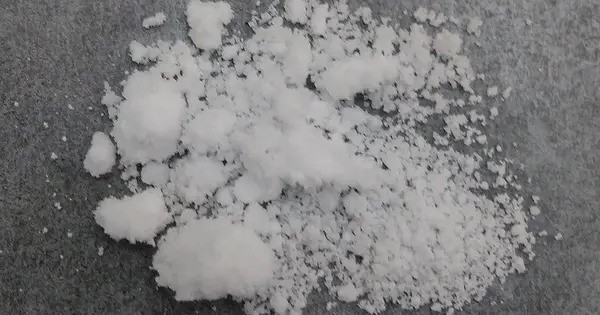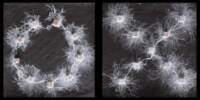Zirconium nitrate is a volatile anhydrous transition metal nitrate salt of zirconium with formula Zr(NO3)4. It has alternate names of zirconium tetranitrate, or zirconium(IV) nitrate. It is an inorganic compound with the chemical formula Zr(NO₃)₄. It is typically encountered as a hydrated form, Zr(NO₃)₄·xH₂O.
Properties
Zirconium nitrate pentahydrate dissolves easily in water and alcohol. It is acidic in aqueous solution, and a base such as ammonium hydroxide will cause zirconium hydroxide to precipitate. The pentahydrate crystals have a refractive index of 1.6.
- Formula: Zr(NO₃)₄
- Molar Mass: Approximately 339.24 g/mol (anhydrous form)
- Oxidation State of Zirconium: +4
- Anions Present: Nitrate (NO₃⁻):
- Appearance: White to pale yellow crystalline solid
- Solubility: Highly soluble in water and alcohols
- Decomposition: Zirconium nitrate decomposes upon heating to form zirconium dioxide (ZrO₂), nitrogen dioxide (NO₂), and oxygen (O₂).
Formation
The anhydrous salt can be made from zirconium tetrachloride reacting with dinitrogen pentoxide.
ZrCl4 + 4 N2O5 → Zr(NO3)4 + 4ClNO2
The product can be purified by sublimation in a vacuum. A contaminating substance in this is nitronium pentanitratozirconate. (NO2)Zr(NO3)5.
Zirconium nitrate pentahydrate Zr(NO3)4·5H2O can be formed by dissolving zirconium dioxide in nitric acid and then evaporating the solution until it is dry. However it is easier to crystallise zirconyl nitrate trihydrate ZrO(NO3)2·3H2O from such a solution.
Zirconium is highly resistant to nitric acid even in the presence of other impurities and high temperatures. So zirconium nitrate is not made by dissolving zirconium metal in nitric acid.
Uses
- Catalyst: Often used as a catalyst in organic synthesis.
- Material Science: Used in the preparation of zirconium-containing materials and ceramics.
- Precursor: Acts as a precursor for producing other zirconium compounds.
Safety Considerations
- Oxidizing Agent: Zirconium nitrate is a strong oxidizer and can react vigorously with reducing agents.
- Handling: Should be handled with care, using appropriate protective equipment to avoid inhalation, ingestion, or contact with skin and eyes.
















